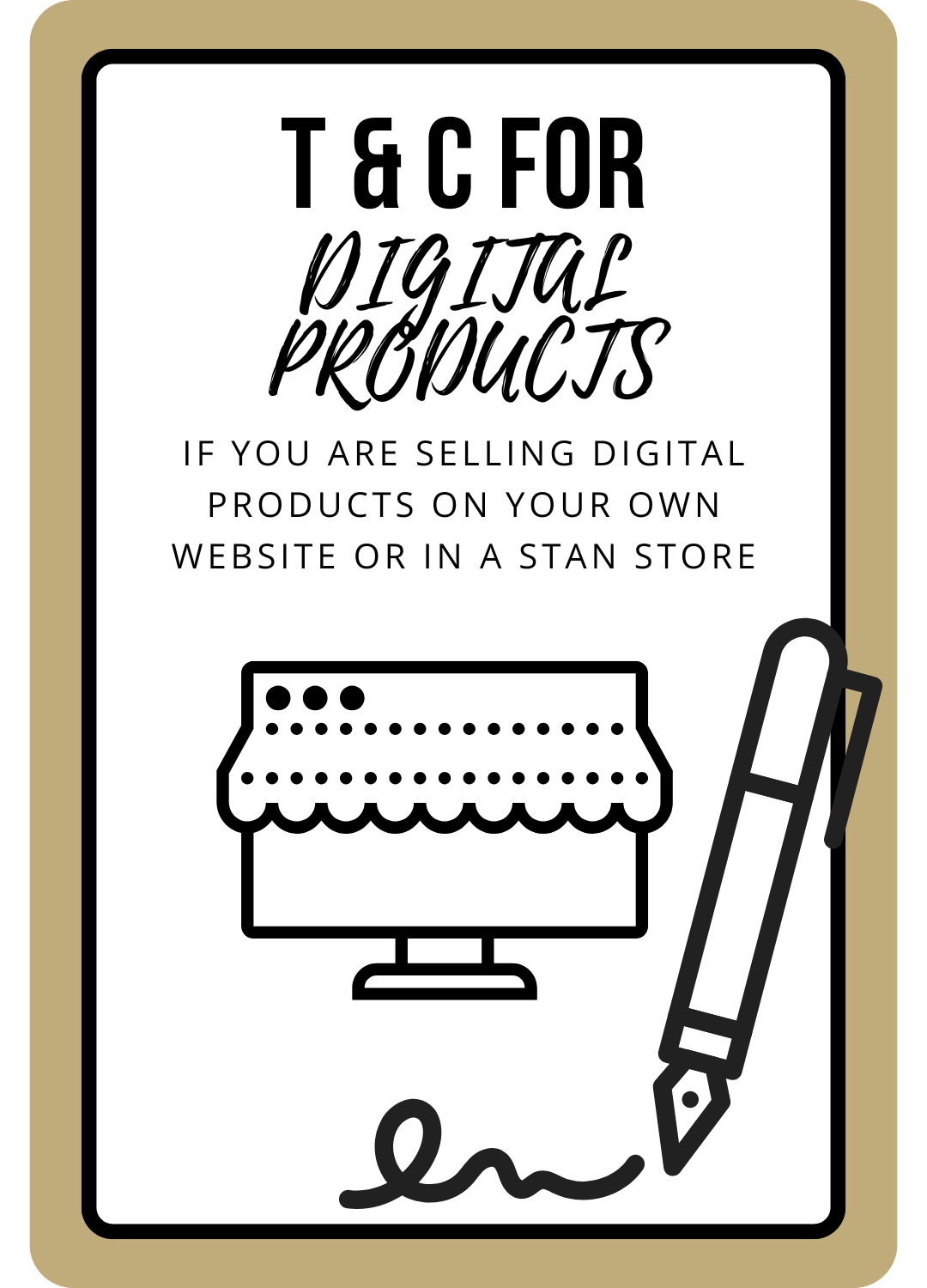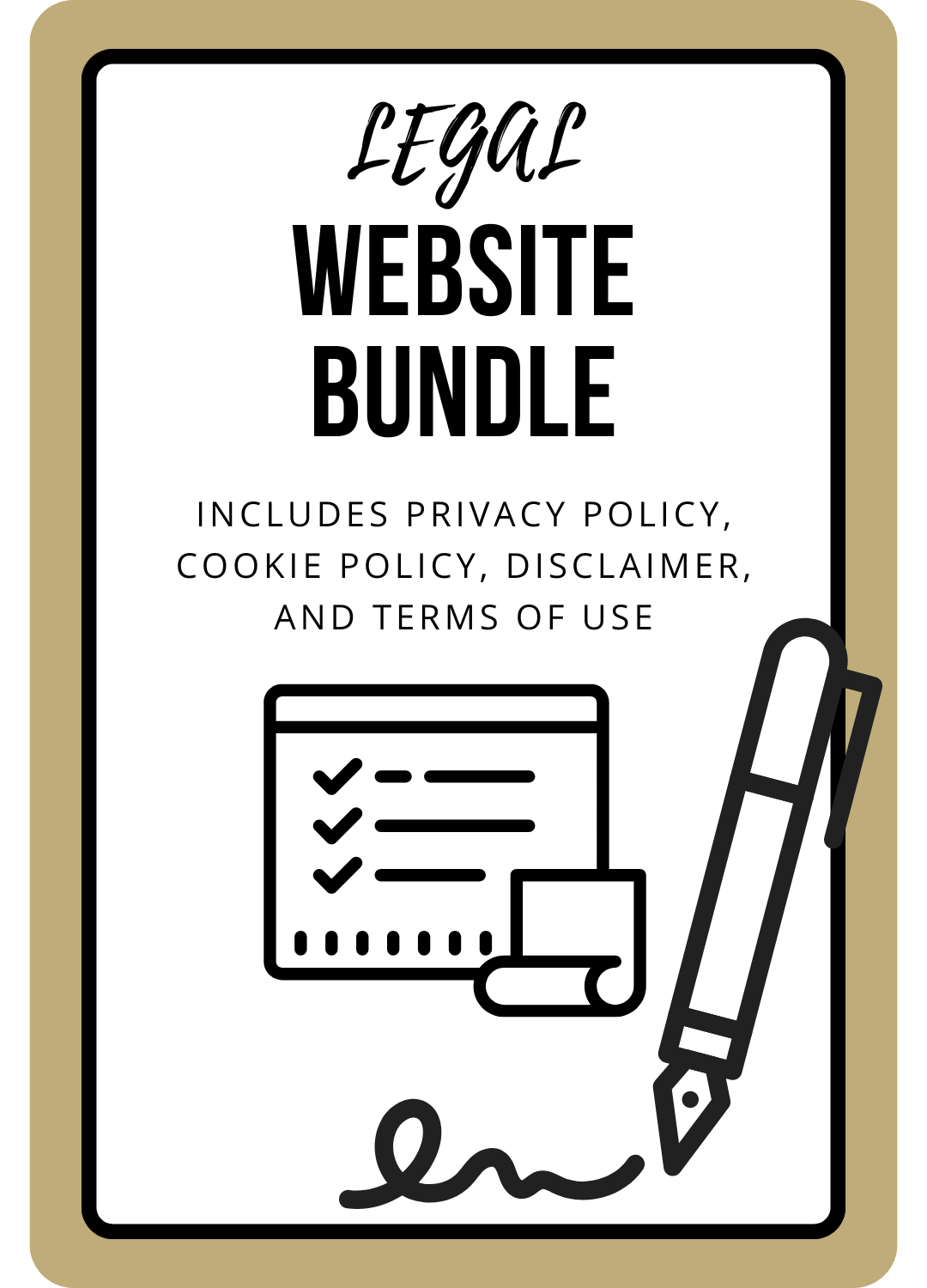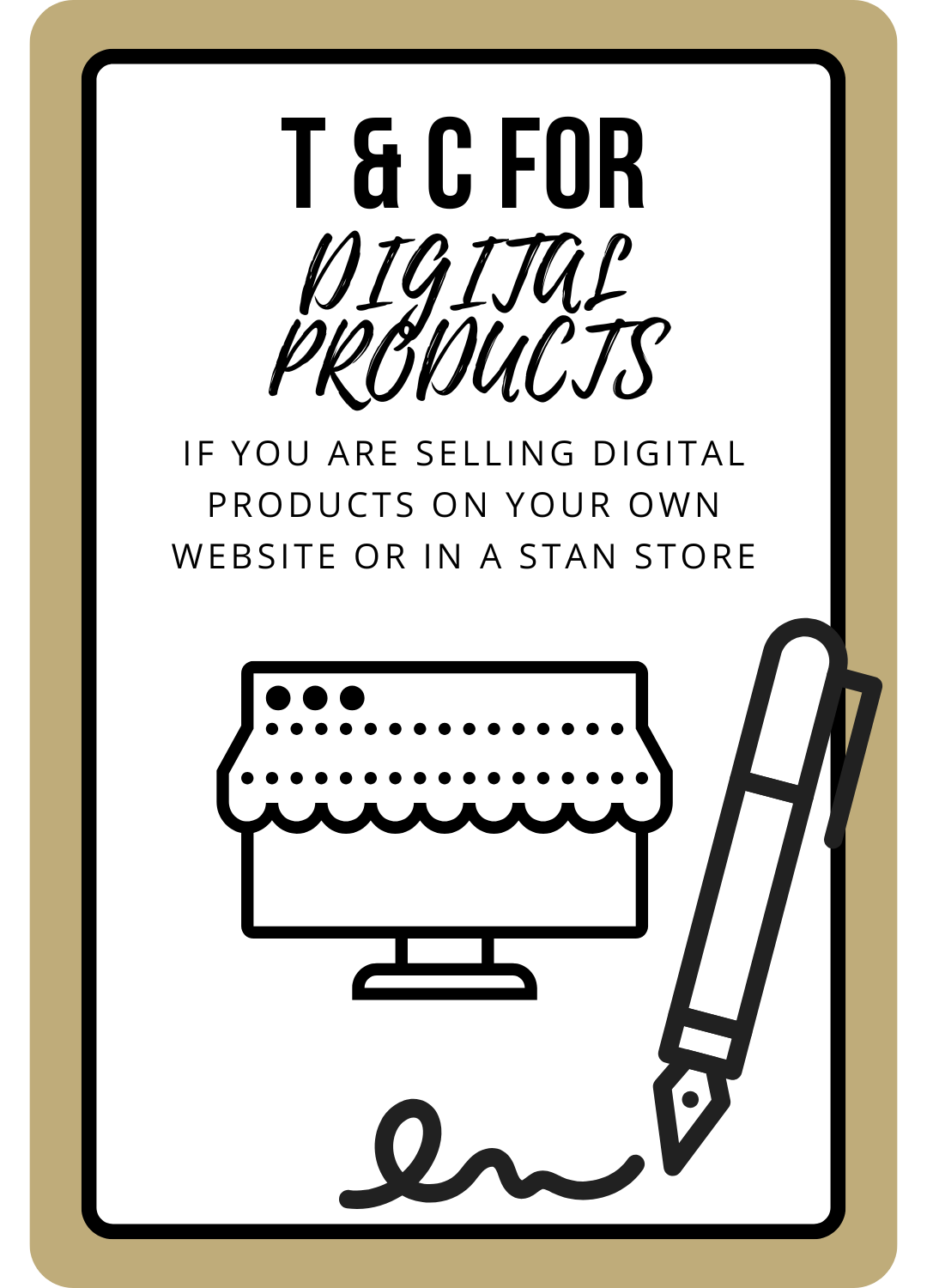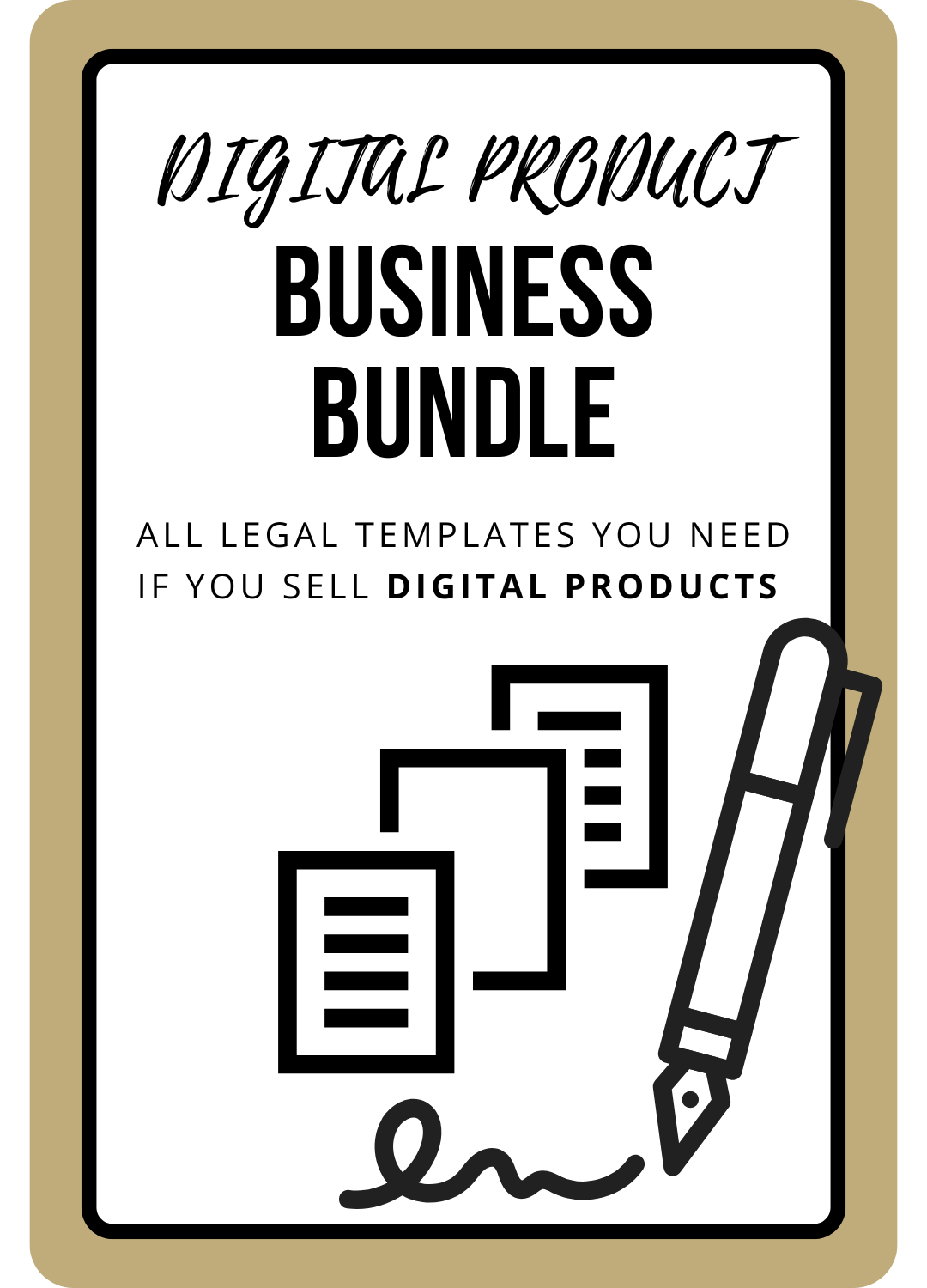11 Must-Haves for Your eBook Terms and Conditions Template (Protect Your IP & Income)
Thinking of selling your own eBook? Without ironclad eBook terms and conditions, you could face refund demands, copycats stealing your content, or even messy legal disputes.
That’s why having the right eBook terms and conditions template isn’t just nice to have — it’s essential. As a lawyer who drafts contracts for online entrepreneurs like you, I’ve seen too many people skip these protections and pay for it later. The good news? You don’t have to be one of them.
In this guide, I’ll walk you through 11 key protections your eBook terms and conditions template must have — complete with real eBook disclaimer examples you can adapt today.
And if you’d rather skip the stress of DIY legal drafting, I’ve got you covered: my ready-to-use Terms and Conditions Template for Digital Products includes everything you need for eBooks (and any other digital downloads).
👉 This post is all about eBook terms and conditions — and how to use them to protect your content, business, and money.
Ultimate eBook Terms and Conditions Template
The 11 Protections You Need for Your eBooks (Plus eBook Disclaimer Examples)
1. Protections Against Incompatible Software or Devices
Ever had a customer complain they couldn’t open your eBook? Maybe they’re trying to read a PDF on an outdated phone, or they’re using software that doesn’t support the format. Without a disclaimer, you could sudde nly be dealing with refund requests or frustrated customers — even though the issue has nothing to do with your product.
Example: A customer buys your eBook in PDF format, but then emails you saying it won’t load on their Kindle. They argue that the product is “defective” and demand their money back, even though the eBook works perfectly fine in the software it was designed for.
That’s why your eBook terms and conditions template must include a compatibility disclaimer. This legal information disclaimer should clearly state:
The format of your eBook (e.g., PDF, EPUB, Word, etc.).
The software or devices it’s designed for (e.g., Adobe Acrobat Reader, Kindle, etc.).
That compatibility can’t be guaranteed with every device or software version.
This way, you protect yourself from liability, avoid unnecessary disputes, and set realistic expectations from the start.
👉 My eBook Terms and Conditions Template already includes this disclaimer, plus niche-specific eBook disclaimer examples for your specific niche for you to choose from — so you don’t have to worry about refund battles over tech issues you can’t control.
2. Protections for Errors and Mistakes
Some customers expect your eBook to be 100% flawless — no typos, no broken links, no outdated info. But mistakes happen. You’re human, and even with the best proofreading, little errors can slip through.
Example: A customer buys your eBook, finds a broken link in one of the chapters, and immediately demands compensation, insisting that the “missing resource” ruined the value of the entire book.
Without the right disclaimer, you could be held liable for every small imperfection. That’s why your eBook terms and conditions should include protections for:
Minor spelling or grammar mistakes
Broken or outdated links
Information that may become inaccurate over time
Blank pages or formatting glitches
With the right clause in place, you’re protected from unreasonable claims — and your customers know upfront that small mistakes don’t entitle them to refunds or damages.
👉 You’ll find this exact protection built into my eBook Terms and Conditions Template, so you don’t have to worry about nit-picky refund requests over harmless errors.
3. Protections Against Expectations and Outcomes (Including Earnings)
Your eBook might be packed with value, but some customers will come in with unrealistic expectations. They might assume it includes content you never promised — or that it guarantees specific results.
Without a proper results and outcomes disclaimer in your eBook terms and conditions, you could face angry messages and refund demands when those expectations aren’t met.
Example: You release an eBook on growing a freelance business. A reader buys it, skims a few chapters, and then complains they didn’t land any new clients in their first week. They argue that your eBook “didn’t work” and demand their money back — even though they never applied the strategies you outlined.
To protect yourself, your eBook terms and conditions template should make it clear that:
You don’t guarantee any specific results, outcomes, or earnings.
Customers are responsible for how they use the content and what results (if any) they achieve.
These are just a few eBook disclaimer examples from my template that manage expectations upfront and protect you from unfair claims based on results you can’t control.
👉 My Terms and Conditions for Digital Products includes these disclaimers, so you don’t have to worry about customers blaming you for results that are outside your control.
4. Protections Against Copycats
One of the biggest fears for eBook creators is having their hard work stolen. Without the right protections, a dishonest buyer could easily copy your content, tweak the design, and resell it as if it were their own.
Example: Someone purchases your eBook, changes the cover and title, and uploads it to an online marketplace under their own name. Weeks later, you discover your exact content being sold by a “competitor” — and without clear terms, it becomes much harder to enforce your rights.
That’s why your eBook terms and conditions must include:
Intellectual property ownership clauses that state both the content and design of your eBook are your IP.
A copyright disclaimer making clear that customers only purchase a license to use your eBook — not the underlying rights.
These protections make it clear that your eBook can’t legally be copied, resold on other eBook sites, or passed off as someone else’s work.
👉 My eBook Terms and Conditions Template already includes these protections — so your eBook stays yours, no matter who buys it.
5. Protections Against Use for Profit
Even if it’s obvious to you that your eBook is for personal use only, some customers may see it as a business resource they can repurpose for their own gain. Without clear restrictions, they might resell it, include it in paid programs, or even distribute it to their own clients.
Example: A coach buys your eBook and then bundles it into their group program as a “bonus resource” for their students. Suddenly, dozens of people are getting your work without ever paying you directly.
That’s why your eBook terms and conditions template should clearly state that:
The eBook is for personal use only.
Customers may not resell, repurpose, or use it to service their own clients.
Any commercial use of your content is strictly prohibited.
This ensures your work is protected and that your sales only benefit one person — you.
👉 My Terms and Conditions for Digital Products template spells this out clearly, so you don’t lose sales to people exploiting your content for profit.
6. Protections Against Free Sharing
Even if customers know they can’t resell your eBook, many still assume it’s fine to “share” it with friends, family, or colleagues. Without a clear restriction, one purchase can quickly turn into dozens of unpaid readers.
Example: A customer buys your eBook and forwards the PDF to their business mastermind group. Within days, 20 people are using your content — but only one person actually paid for it.
That’s why your eBook terms and conditions should explicitly state that:
The eBook may not be shared with anyone, whether for free or for profit.
Purchase grants a single, non-transferable license for personal use only.
By spelling this out, you close any loopholes and make it clear that “sharing” is just another form of unauthorized distribution.
👉 My eBook Terms and Conditions Template includes this protection, so your sales aren’t undercut by free circulation of your work.
💡 Want to skip the stress of writing these clauses yourself?
My Terms and Conditions for Digital Products template is lawyer-drafted, customizable, and covers all the protections we’ve discussed so far — plus more.
With it, you’ll:
✅ Protect your eBook from copycats and free-sharers
✅ Stop refund demands before they happen
✅ Set clear rules on what buyers can and can’t do
✅ Save hours of guesswork with a plug-and-play template
👉 Grab your Terms and Conditions for Digital Products here and get peace of mind while selling your eBook.
7. Protections Against Valid Claims
Sometimes, a customer really does have a valid complaint. Maybe they received the wrong file, or the eBook they downloaded is completely blank. In those cases, they’re entitled to a remedy — but without limits in place, you could be on the hook for far more than what they paid.
Example: A buyer accidentally receives the wrong eBook file and claims damages, arguing that the “lost time” of waiting for the right version is worth more than the price they paid. Without a liability cap, they could demand compensation that far exceeds your actual sale.
That’s why your eBook terms and conditions should limit liability for valid claims to:
The purchase price of the eBook (not its perceived “value”), and
The exact amount paid by the customer and received by you.
This way, you stay fair to your customers while ensuring one small mistake doesn’t spiral into a major financial loss.
👉 My eBook Terms and Conditions Template includes liability limits that protect your business while still keeping things customer-friendly.
8. Protections Against Repayment Requests
Unlike physical products, eBooks can’t be “returned.” Once a customer downloads your file, they have permanent access to your work. Without a strict refund policy, though, some buyers will still try to get their money back — even after consuming the entire book.
Example: A customer binge-reads your 150-page eBook in one weekend, then emails you saying it “wasn’t what they expected” and demands a full refund. Without a no-refund clause, you may feel pressured to give in — even though they’ve already benefited from your content.
That’s why your eBook terms and conditions should include:
A waiver of any statutory “cooling-off period” (where applicable).
An explicit statement that refunds are not provided under any circumstances.
This makes your policy crystal clear before purchase and prevents abuse from customers who want free access to your work.
👉 My Terms and Conditions for Digital Products Template includes a solid no-refund policy — so you won’t be stuck issuing refunds to readers who already got full value from your eBook.
9. Protections Against Claims for Updated Versions
As your expertise grows, you may update your eBook with new chapters, updated stats, or fresh strategies. But without a clear policy, past customers may assume they’re automatically entitled to every future version for free.
Example: You launch Version 2.0 of your eBook with double the content and a higher price. A previous buyer emails demanding the new edition at no cost, insisting that “lifetime access” should include all future updates — even though you never promised that.
To avoid disputes like this, your eBook terms and conditions should clearly state whether:
Customers always receive updated versions,
Customers only receive updates under certain conditions (e.g., being on your email list), or
Customers do not receive updates at all unless they purchase again.
By spelling out your policy in advance, you manage expectations and protect yourself from unfair demands.
👉 My eBook Terms and Conditions Template includes ready-to-use language for handling updates — so you can decide what works best for your business.
10. Protections Against Deviations from the Sales Page Description
Your sales page should accurately describe your eBook, but even with the best copy, some customers will interpret it differently. Without a disclaimer, they may argue you didn’t deliver what was “promised.”
Example: You describe your eBook as a “step-by-step guide to online marketing.” A buyer complains that it didn’t cover TikTok ads in detail and insists the product wasn’t as advertised — even though you never said it would.
To protect yourself, your eBook terms and conditions should include a disclaimer that:
The contents of your eBook may differ slightly from the way they’re described on your sales page.
The sales page provides general information, but the final product may vary in details, examples, or emphasis.
This clause helps manage expectations and shuts down claims based on misunderstandings of your sales page.
👉 My Terms and Conditions for Digital Products Template includes this protection — so you’re covered if customers interpret your sales page differently than intended.
11. Protections Against Data Protection Authorities
What happens the moment someone buys your eBook? You’re not just delivering a download — you’re collecting their personal data, like their name, email address, and payment details. And that instantly puts you on the radar of privacy laws like the GDPR.
If your terms don’t make it clear how this data is handled, you’re technically breaking the law. Regulators can issue steep fines, and customers may lose trust in your business before you’ve even made your first sale.
That’s why your eBook terms and conditions template should always reference your Privacy Policy. The Privacy Policy itself explains how you collect, use, and store personal data — while your eBook terms and conditions point customers to it, so there’s no confusion.
👉 My eBook Terms and Conditions Template includes this reference — and if you still need a solid Privacy Policy, you’ll find it inside my Legal Website Bundle.
The ULTIMATE eBook Terms and Conditions Template Free of Fluff
Selling an eBook is exciting — but it also comes with risks like refund demands, copycats, and unrealistic customer expectations. The right eBook Terms and Conditions Template takes those worries off your plate, so you can focus on creating and selling with confidence.
Instead of piecing things together on your own, you can use a lawyer-drafted template that already includes every protection we’ve just covered (and more). With it, you’ll:
✅ Protect your eBook from copycats and unauthorized sharing
✅ Prevent refund demands and repayment requests
✅ Set clear rules on how your eBook can (and can’t) be used
✅ Manage customer expectations around results, updates, and sales page descriptions
✅ Save hours of time with a ready-to-use, customizable template
👉 Get your ready-to-use Terms and Conditions for Digital Products Template today and protect your eBook, your income, and your business in just a few clicks.
With the right contracts in place, you’ll not only look more professional — you’ll save yourself from costly headaches down the road.
Need More Than Just eBook Terms and Conditions?
If you’re selling more than eBooks — like online courses, memberships, downloads, or templates — you’ll need more than a single contract to stay protected. That’s where my Digital Product Business Bundle comes in.
This bundle includes everything you need to legally protect your digital product business in one place:
✅ Terms and Conditions for Digital Products (covers eBooks, downloads, memberships & more)
✅ Terms and Conditions for Online Courses (protects your courses from refunds & copycats)
✅ Privacy Policy (required by law if you collect emails or payments)
✅ Website Terms & Conditions (set the rules for anyone using your site)
✅ Testimonial Release Form (so you can share client reviews safely and legally)
With these online T&Cs, you’ll:
Protect all your digital products, not just your eBook
Stop refund demands and manage customer expectations
Build trust with customers through professional policies
Stay compliant with data protection laws
Avoid legal headaches before they start
👉 Get the Digital Product Business Bundle here and protect your entire digital business for less than the cost of one custom-drafted contract.
This post was all about the protections your eBook terms and conditions template must have to protect your eBook’s content, business & money.
Learn more about what you need in terms and conditions for digital products:









